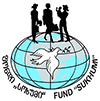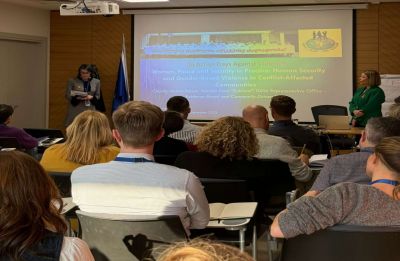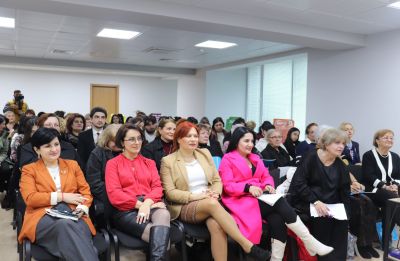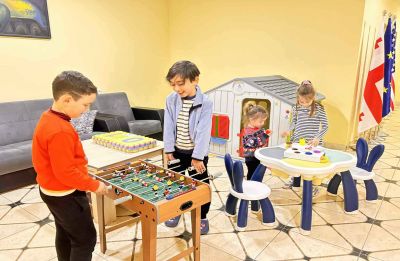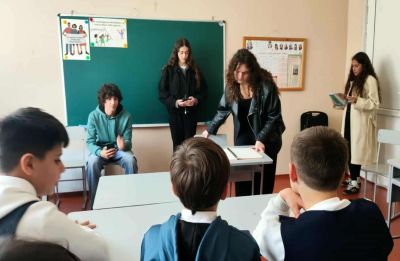



This time, the meeting of Senaki Club of Voter Women was held at the Community Education Center at the invitation of the head of the center, Nona Kadaria. The center is located in the military settlement of Senaki, where IDPs from Abkhazia live, therefore the majority of the participants of the meeting were IDP women.
There was held a discussion of social issues concerning the residents of the town. Particularly acute is the issue of a damaged sewerage system that has been causing huge discomfort for people for years, the basement of residential buildings is full with water, because of improper connection of pipes, sewage waste leaves the soil surface, in summer the territory is full of mosquitoes. Residents have repeatedly applied to both local government and the Ministry for IDPs, but the issue is constantly being postponed. Members of the Club tried to find ways out of the situation and noted the importance of wide publicity of these problems.
Also, there was a discussion of closing the checkpoints on the administrative border with Abkhazia and the need to simplify the transition on the occasion of the funeral.


In the Center of Democratic engagement of Ozurgeti, there was held a meeting of the Club of Voter Women, which was attended by the representatives of the City Hall and Sakrebulo, members of the GAC, staff of the central library and historical museum, teacher of schools and kindergartens.
They heard the information about the programs of 2016 budget. The women suggested that they will spread this information and everyone who need various assistance will learn and use it.
The chairperson of social service of Ozurgeti Municipality, representatives of the city Hall, recorded the problems, raised at the meeting and promised to solve them.
There was planned to prepare joint letter in the name of the Ministry of Culture regarding rehabilitation of historical museum. According to this the lawyer of the GAC will meet the director and staff of the museum.


During the meeting of the Club of Voter Women, the participants spoke about the results of the first round of 2016 parliament elections and about a need to raise political participation of women in the elections of local government in 2017.
The conversation touched gender quoting, reflecting the gender issues in election programs of the party.
Out of participants there was chosen a group of advocacy. The club members decided to study and solve IDP problems, who reside in collective center of kindergarten on Tsereteli Street.
The project is implemented with the support of the U.S. Embassy in Georgia



On March 27, in Zugdidi, there was held a meeting of the Club of Voter Women on the topic "The Importance of Women's Activity in the Public and Political Life of the Country". The meeting was attendee by Women deputies of Sakrebulo - Iruza Kakava and Edita Kodua. They talked about many things: current issues, forthcoming elections, gender aspects of elections and the need for women's political participation. Several members of the Club are going to be nominated in the election. They received important advices from women deputies.
The project is implemented with the support of the U.S. Embassy in Georgia



On August 19, there was held a meeting of the Club of Voter Women in Women Support Centers of Senaki. Meeting participants received information about completion of the project, also about a fact that evaluator of the project comes, who wants to meet the participants.
The women spoke about strength and weaknesses of the project, about changes, challenges, opportunities and results.
It was pleasant for them to hear that the club will continue the work in frames of new project. The women planned advocacy of actual problems through active cooperation with local government and GAC.




The club of Voter women updated its activities in Khobi. It became possible through financial support of the US Embassy in Georgia in the framework of the project "The active involvement of women in the political life of Georgia through democratization of electoral processes."
At the meeting, members of the Club were informed about the goals and objectives of a new project on the planned activities and expected results, about the club's past activities, successful examples of advocacy of local problems, etc.
It was held a discussion of future plans, in particular, to participate in training on the election campaign, the political system and the role of women. Also considered the organizational question of the silent action in support of women candidates in the parliamentary elections.
Khobi women are pleased that the activities of the Club will be re-activated, and together they will be able to solve many important problems.
The project is implemented with the support of the U.S. Embassy in Georgia




In the Center of Democratic Engagement there gathered the members of the Club of Voter Women of Batumi. Participants of the meeting spoke about the issues, advocacy of which was carried out also defined the needs of new beneficiaries and strategy of advocating their problem. In parallel with other issues, it was decided to advocate the question of free psychological conultations for the disabled in the Ministry of Health and social care.
At a meeting of the club there was distributed information about government social programs. They decided that the advocacy group comes to all relevant government services to obtain detailed information about the programs and groups, who are the beneficiaries and helps to use these programs.
It has been said that the Club of Women Voters and the Gender Advisory Council are trying to contribute to citizens' communications, and first of all the women's groups, with local government.


The club of voter women started advocacy of the problem of one of the residents of Urekhi Street. The family lives in poverty, they were left without social assistance and attention. There is disabled person in family, who needs special care. The main necessity is roofing. The meeting was attended by Zaza Khimshiashvili – deputy of Mayor’s representative. He mentioned that will assist in problem solution.
The meeting was attended by the representative of cherity organization “Ialkani”. In frames of this project it will be possible to provide this family with everyday meals.
The club will also discuss the issue of involvement in the campaign of 16 active days.
The project is implemented with the support of the U.S. Embassy in Georgia


The meeting discussed results of parliament elections. Unfortunately Tskaltubo did not resent women candidates and it was mentioned by the club members.
The second part of the meeting was devoted to the definition of problems, which will be advocated by the Club. First of all, there was allocated question of transportation of students and teachers.
It was agreed to prepare a letter to the local government's name, and at the next meeting to invite people who can resolve this problem.
Club of Women-Voters expressed a desire to be actively involved in the campaign of 16 active days against violence towards the women. Specific activities were planned.
